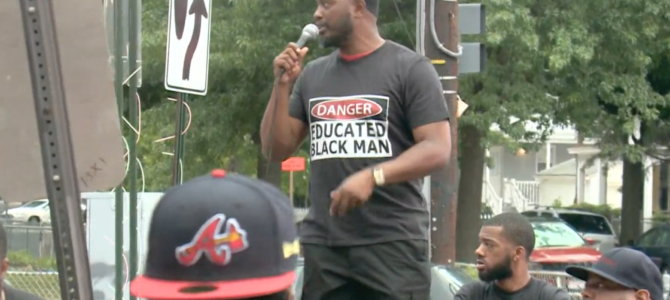In the same spot where 6-year-old Nyiah Courtney was shot and killed two weeks ago, 100 black men gathered to hold their community accountable.
“The responsibility of the safety of this community is on the people who live in this community,” said Advisory Neighborhood Commission 8C Chair Salim Adofo.
The event “100 Black Men for Peace and Empowerment” called on strong black men to lead an effort to organize and support their community. On Saturday, the group went door-to-door in Southeast Washington, D.C., handing neighbors pamphlets with information about work development programs, how to pay back rent, and where to receive mental health help. The group also called for an end to gun violence and helped clean trash off the streets.
“When we can see black men doing some positive things in the very community in which they live, we can start to change the way people view their neighborhoods. We should be neighbors opposed to, ‘Oh, those are just people who live there,'” Adofo said.
Building bridges between neighbors is an effort to rebuild communities, Adofo said. With rising crime rates in predominately black neighborhoods and community members’ growing suspicion of law enforcement, many violent crimes go unreported. Adofo wants to change that.
Violent crime has skyrocketed in cities supporting Black Lives Matter’s “anti-police” narrative. In 2018, there were 16,214 murders in the United States (with one chart reflecting 14,123 total murders that year), about half of which were black victims. Of single-victim, single-offender situations, about 89 percent of black victims were killed by black assailants, as The Federalist reported. Despite making up only 13 percent of the population, black Americans committed 52 percent of all homicides between 1980 and 2008, according to the Deparatment of Justice.
In a recent letter, Mayor Muriel Bowser linked D.C.’s spike in killings to court failures, which D.C. Superior Court Judge Anita Josey-Herring denied. While court systems have been operating at a slower pace due to the pandemic, homicide rates in Washington, D.C., have been steadily increasing for years.
Pretty surprising back and forth between @MayorBowser and D.C. Superior Court Chief Judge Anita Josey-Herring on Friday. Bowser linked the current spike in killings to the courts operating at limited capacity. Josey-Herring responded that the courts have been working. pic.twitter.com/BYGHP9U78g
— Martin Austermuhle (@maustermuhle) July 24, 2021
The city is experiencing a severe staffing shortage at the D.C. 911 dispatch, which fields calls relating to violent crime. This shortage is a product of employees on a combination of family leave, personal leave, and sick leave — and, according to the emergency agency’s interim director, Cleo Subido, who implemented mandatory overtime, it’s also a product of slacking.
“Currently, the District is paying us for 12 hours and we are plugged into the radio for less than seven hours for the most part,” Subido wrote.
With apathy, poor leadership, understaffing, and crime on the rise, including 106 homicides this year in the District, people like Adofo are turning inward to combat violence.
“This is on us as a community,” Adofo said. “We want to make sure that we can get the resources to the people that are in the most need so that we can stop the gun violence.”









